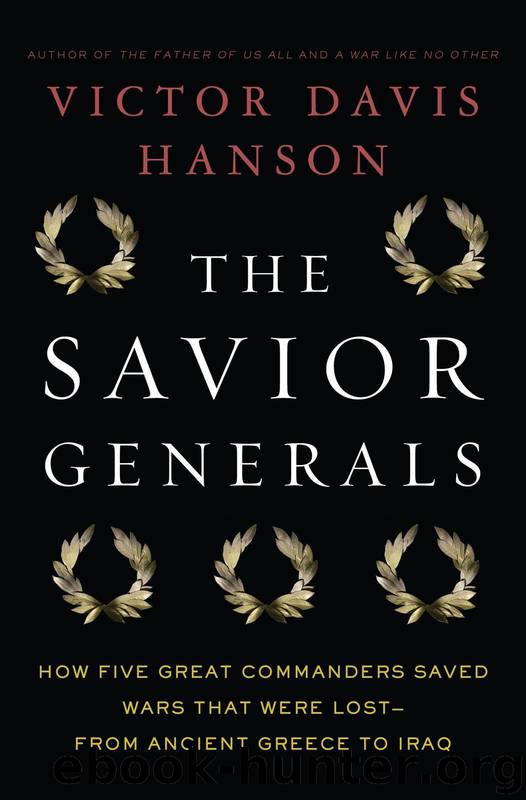The Savior Generals: How Five Great Commanders Saved Wars That Were Lost—From Ancient Greece to Iraq by Victor Davis Hanson

Author:Victor Davis Hanson
Language: eng
Format: mobi, epub
Tags: Non-Fiction
ISBN: 9781608191635
Publisher: Bloomsbury Press
Published: 2013-05-13T22:00:00+00:00
On the Brink (December 1950–January 1951)
On Christmas Day 1950, six months after the North Korean invasion of the south, Matthew Ridgway landed in Japan. In just half a year, United Nations forces had almost lost the war at Pusan, rallied to reclaim the South at Inchon, nearly finished the conflict by overrunning all of North Korea to the Yalu River—and were in danger of losing Seoul for a second time and with it all of South Korea. The next day, Ridgway met General MacArthur for a short briefing. Ridgway immediately found himself in an awkward position. MacArthur was his superior officer—whose own carelessness had contributed to the present fiasco on the Yalu and helped to bring Ridgway to Korea. The septuagenarian World War II hero was still wildly popular at home and had established a formidable public relations lobby both in Japan and the United States. He certainly had proven a superb proconsul in Japan. But as Ridgway knew from his recent tenure at the Pentagon, MacArthur was increasingly dismissed as a megalomaniac by many of the Joint Chiefs, who had long wanted to relieve him. How could a subordinate serve under such a figure at once responsible for both saving Korea at Inchon and nearly losing it at the Yalu?30
Yet even in the apparent collapse of the American cause, Ridgway grasped that once MacArthur had crossed the 38th Parallel, his two-pronged advance to the Yalu had not been entirely foolhardy. After all, he had sent United Nations troops to the northernmost tip of the Korean peninsula with astoundingly light losses—until the hammer of Chinese intervention fell. That fact told Ridgway that the Communists, at least the North Koreans, were not supermen. They could be pushed back again. MacArthur could sound unhinged in his rants about expanding the war, but, better than most, he understood the ultimate hegemonic intentions of both Communist China and the Soviet Union in Asia. The problem with the mercurial MacArthur was not his appreciation of the Communist threat and the misery it meant for millions under its sway, but finding the proper strategy to thwart it.31
In this meeting in Tokyo on December 26—later characterized as “detailed, specific, frank, and far-ranging”—the newly appointed Ridgway was ordered to withdraw to positions to ensure that Seoul not be lost for a second time. Yet he was still supposed to inflict enough damage on the Chinese to allow some measure of maneuvering for American diplomacy with the Communists. Although Ridgway had not yet landed in Korea and assessed the state of American forces, he wondered whether an immediate offensive might be allowable to MacArthur. “The Eighth Army is yours, Matt,” MacArthur famously replied. In fact, MacArthur had no detailed plans for how to stop the Chinese advance. He seemed more interested in fighting a public relations battle with Washington.
On arriving in Korea, Ridgway quietly learned that his hopes of immediate offensive operations were in vain. Instead, he discovered that the catastrophe was even worse than reported. His Eighth Army was in shambles.
Download
The Savior Generals: How Five Great Commanders Saved Wars That Were Lost—From Ancient Greece to Iraq by Victor Davis Hanson.epub
This site does not store any files on its server. We only index and link to content provided by other sites. Please contact the content providers to delete copyright contents if any and email us, we'll remove relevant links or contents immediately.
The Secret History by Donna Tartt(19086)
The Social Justice Warrior Handbook by Lisa De Pasquale(12190)
Thirteen Reasons Why by Jay Asher(8909)
This Is How You Lose Her by Junot Diaz(6885)
Weapons of Math Destruction by Cathy O'Neil(6279)
Zero to One by Peter Thiel(5801)
Beartown by Fredrik Backman(5754)
The Myth of the Strong Leader by Archie Brown(5507)
The Fire Next Time by James Baldwin(5442)
How Democracies Die by Steven Levitsky & Daniel Ziblatt(5218)
Promise Me, Dad by Joe Biden(5153)
Stone's Rules by Roger Stone(5087)
A Higher Loyalty: Truth, Lies, and Leadership by James Comey(4960)
100 Deadly Skills by Clint Emerson(4924)
Rise and Kill First by Ronen Bergman(4788)
Secrecy World by Jake Bernstein(4752)
The David Icke Guide to the Global Conspiracy (and how to end it) by David Icke(4717)
The Farm by Tom Rob Smith(4507)
The Doomsday Machine by Daniel Ellsberg(4490)
